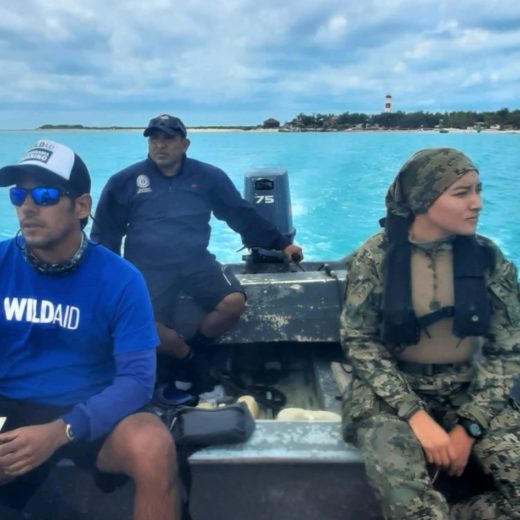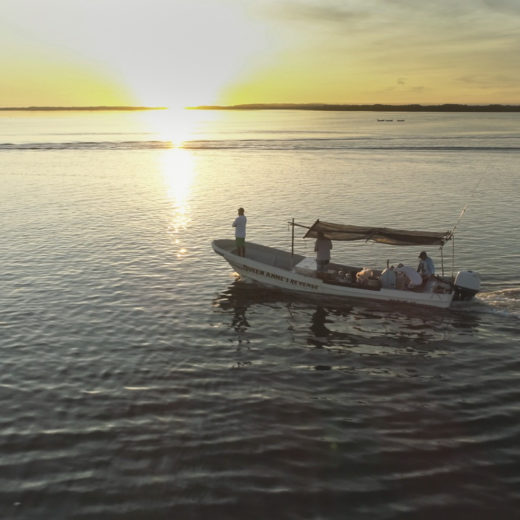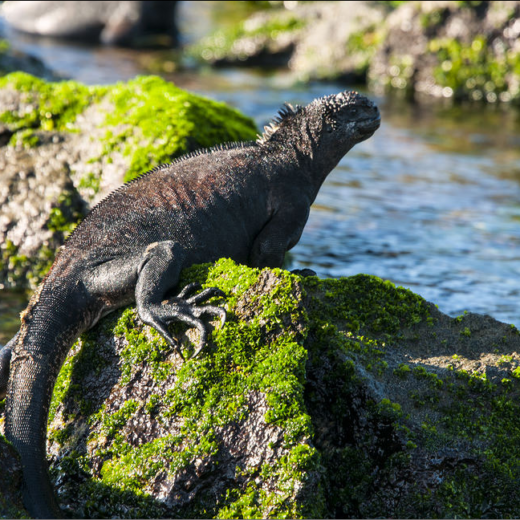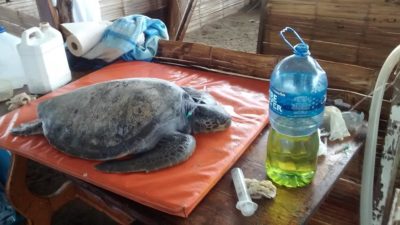
BY SILVIA SANCHEZ, WILDAID MARINE PROGRAM
We’re excited to announce that WildAid has now partnered with the Machalilla wildlife hospital in Ecuador to provide comprehensive protection for sea turtles.
The seven species of sea turtle found today have been around for 110 million years. Unfortunately, six of those species are listed on the International Union for Conservation of Nature’s Red List as endangered or critically endangered, primarily due to longline fisheries, harvesting of turtle meat and eggs, predation and habitat degradation, among others.
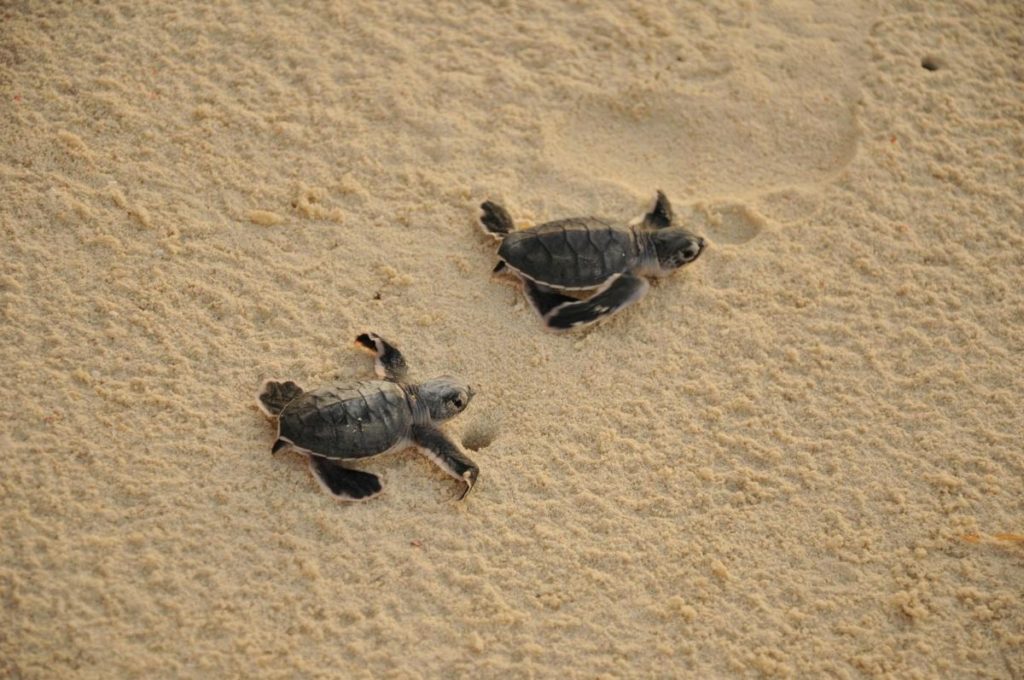

After spending many years at sea (females from different species reach maturity at different ages, with some as old as 20-50 years of age), sea turtles return to the same spots to nest– migrating as far as 1400 miles between their feeding and nesting grounds.
Ecuador’s beaches provide an ideal nesting spot for four sea turtle species (Green Turtles, Leatherbacks, Olive-Ridley and critically endangered Hawksbill sea turtles). Over the past year, we’ve partnered with park rangers along Ecuador’s coast on various sea turtle conservation projects that include underwriting at-sea patrols, removing abandoned drift nets, marking and protecting nests from predators, releasing more than 15,000 sea turtle hatchlings into the sea, and educating the local community about the importance of sea turtles.
Sea turtles, which can live up to 80 years, are an important part of a healthy marine ecosystem and can generate more than one million dollars in annual tourism revenue. This year, WildAid is expanding sea turtle conservation efforts by working with a grassroots wildlife rehabilitation hospital at Machalilla National Park that has treated nearly 150 sea turtles, 10 sea lions and 300 sea birds over the last four years.
Sea turtles treated in the wildlife rehabilitation hospital suffer from various injuries including lesions and internal damage by fishing hooks or from getting trapped in or consuming marine debris/plastics. The wildlife hospital volunteers treat injured marine wildlife from the entire country’s coast.
It is the only facility of its kind in Ecuador and was previously funded from t-shirt sales and donations from the community. With improved infrastructure and equipment provided by WildAid, the hospital will expand operations to provide more marine wildlife with a second chance at life. Currently, there are 17 resident turtles undergoing treatment and with our support, veterinarians will be able to treat up to 27 turtles over the next year.
Work with sea turtle populations provides an opportunity to inform our future work in Machalilla, as well as that of other regions. Data collected may include trends in wildlife injuries, infectious diseases, migration patterns, systemic medical issues, and human-animal interactions, among others. This data can help inform and educate tourism and fishing policy, and provide best practices for managing Ecuador’s MPAs and fisheries to conserve the country’s marine biodiversity.
Español
WildAid Colabora con la clínica de rehabilitación de tortugas marinas en Machalilla
Estamos orgullosos de anunciar que WildAid va apoyar los esfuerzos de la clínica de rehabilitación de Machalilla en Ecuador para proveer protección comprensiva para las tortugas marinas.
Las siete especies de tortuga marina que se encuentran hoy día han estado aquí por 110 millones de años—cerca del tiempo de los dinosaurios. Desafortunadamente, seis de esas especies se encuentran en peligro de extinción, debido principalmente a la pesca por palangre, la cosecha de sus huevos y carne, la depredación, la destrucción de su hábitat y numerosas otras amenazas. Después de pasar varios años en el mar (las hembras llegan a la madurez sexual a diferentes edades, algunas hasta los 20-50 años de edad), las tortugas marinas regresan a los mismos lugares a crear sus nidos—nadando hasta 1,400 millas entre los sitios donde comen y los sitios de los nidos.
Las playas de Ecuador proveen un sitio ideal para los nidos de cuatro especies de tortuga marina. A través del año pasado, nosotros hemos coordinado con los guardaparques de la costa de Ecuador en varios proyectos de conservación de tortuga, cuales incluyen financiando patrullas en el mar, desechando de mallas abandonadas, marcando y protegiendo los nidos de los depredadores, ayudando que más de 15,000 tortugas crías lleguen al mar y educando a la comunidad sobre la importancia de las tortugas marinas.
Las tortugas marinas, cuales pueden vivir hasta 80 años, son una parte importante de un ecosistema marítimo saludable y pueden generar hasta un millón de dólares en turismo. Este año, WildAid va expandir sus esfuerzos de la protección de las tortugas marinas al apoyar el centro de rehabilitación de Machalilla cual ya ha rescatado casi 150 tortugas marinas, 10 lobos marinos y 300 aves marinas a través de los últimos cuatro años.
Las tortugas marinas tratadas en el centro de rehabilitación sufren de varias lesiones incluyendo daños internos por los anzuelos de pesca o por atrapamiento en o ingestión de basura o plásticos en el mar. Los voluntarios del centro reciben a sus pacientes de la costa entera de Ecuador.
La clínica es el único centro de rehabilitación de las especies marinas en Ecuador y fue previamente financiado por las ventas de camisetas y donaciones de la comunidad. Con mejor infraestructura y equipo proveído por WildAid, la clínica podrá expandir sus operaciones para darle a mas vida marina una segunda oportunidad a vivir. Actualmente hay 17 tortugas en rehabilitación y con nuestro apoyo, el centro podrá cuidar a 27 tortugas e través del próximo año.
El trabajo con las poblaciones de tortugas marinas nos dará una oportunidad de informar trabajo futuro en Machalilla y en otras regiones. La información colectada puede incluir pautas en las lesiones entre las especies marinas, enfermedades infecciosas, rutas de migración, temas médicos sistémicos, e interacciones entre humanos y la vida silvestre marina. Esta información nues puede ayudar a informar las regulaciones del turismo, la pesca y el manejo de las AMPs de Ecuador y sus pesquerías para proteger a la biodiversidad marina del país.
Stay in touch and get the latest WildAid updates.
SIGN UPAbout WildAid
WildAid is a non-profit organization with a mission to protect wildlife from illegal trade and other imminent threats. While most wildlife conservation groups focus on protecting animals from poaching, WildAid primarily works to reduce global consumption of wildlife products such as elephant ivory, rhino horn and shark fin soup. With an unrivaled portfolio of celebrity ambassadors and a global network of media partners, WildAid leverages more than $308 million in annual pro-bono media support with a simple message: When the Buying Stops, the Killing Can Too.
Journalists on deadline may email communications@wildaid.org
